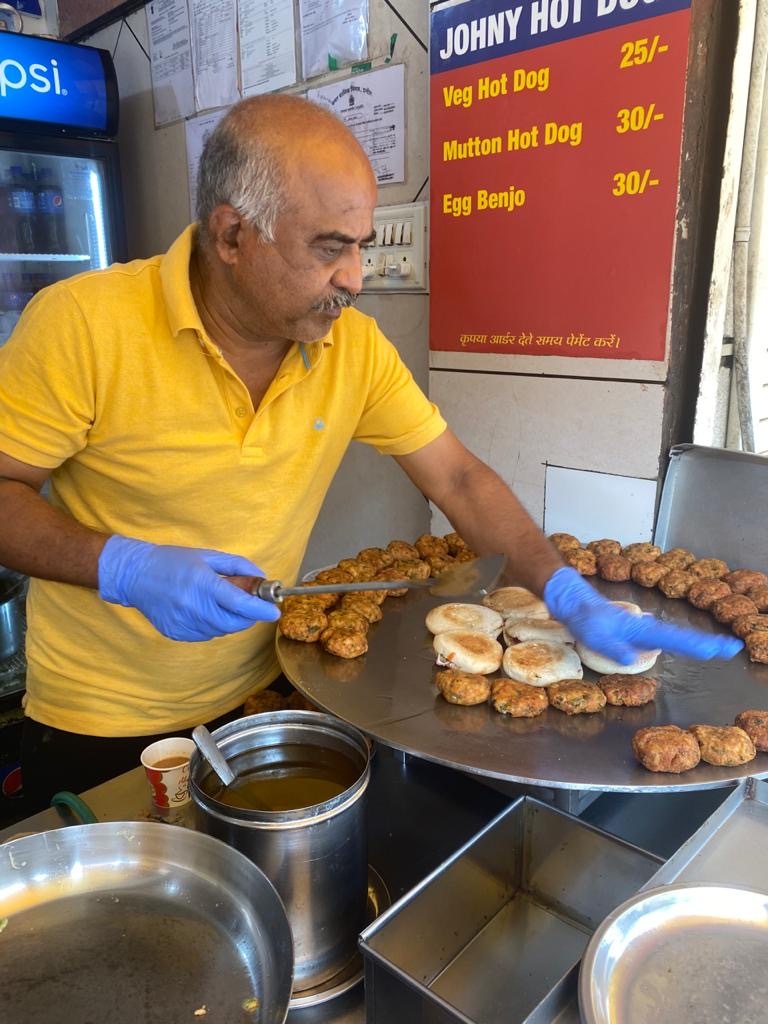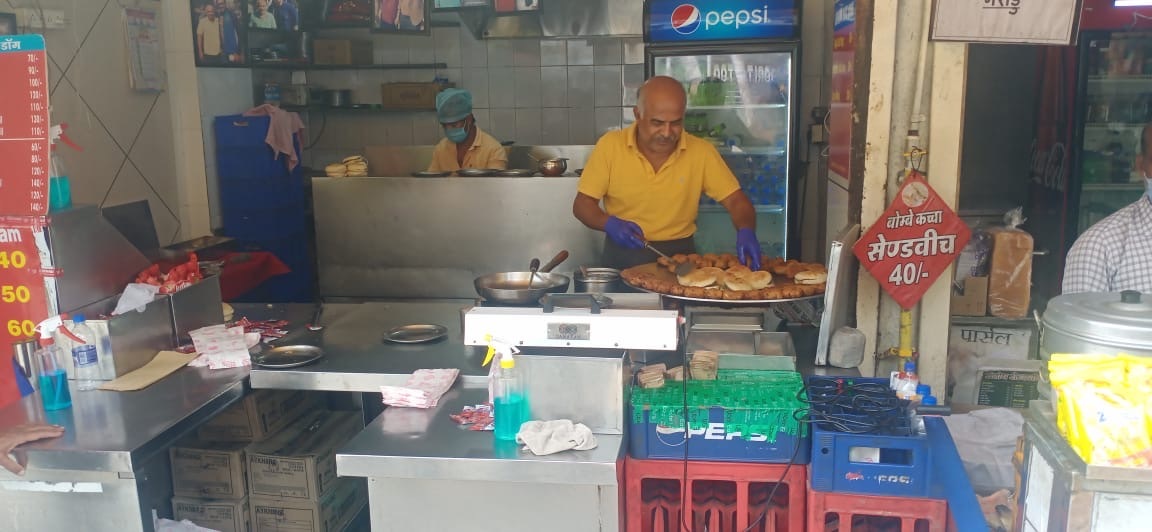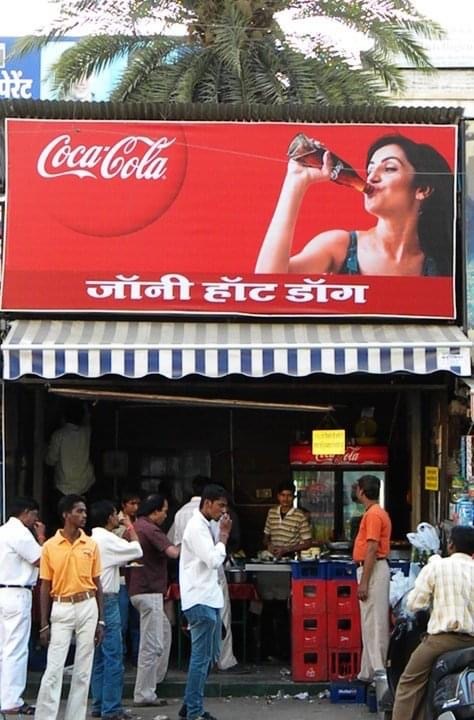Vijay Singh Rathore (60) recalls the days his family had to sleep on an empty stomach. He is the son of a manual labourer and a cook, and was raised with seven siblings in a tiny house in Indore. On several days, making ends meet was a struggle for his family. While five sisters were married off, Vijay and his two elder brothers began working to earn for the family.
After working for a few years as an errand boy and earning Rs 5 or Rs 8 a month, in 1978, Vijay went on to start a food stall named Johny Hot Dog on Chappan Dukan street, Indore. Around 40 years later, the same tiny stall and his infamous ‘hot dog’ have earned him a profit of Rs 3 crores, as well as an award from UberEats, India.

In an interview with The Better India, he explains his entrepreneurial journey, one that is filled with hard work, patience and success.
Bringing something different to the table
With no access to education, when he was 8 years old, Vijay began working at a canteen in the Government Engineering College, Indore. He would serve tea, bread and omelette to lakhs of students throughout the day, but never once felt tired.
“Students are the bright future of this country. Food is the energy that will help them study, so I ensured that whoever walked inside the canteen left with a full stomach. My bread omelette was famous among the students, because sometimes, I would serve the egg in a pav, and sometimes in a bread. So, some students named the dish Banjo, and the name has stuck ever since,” says Vijay, adding that he worked there for a year and a half.
At the age of 11, Vijay decided to start his own food stall. He gathered Rs 4,500 from his savings and by taking a loan from his mother. With this, he purchased a food outlet in 120 sq ft space at Chappan Dukan.
Vijay did not want to conform to the several other stalls in the city that served samosas and kachoris.
“There were two reasons for this. One, I wanted to serve something that would stand out from the crowd. Two, the investment cost for making samosa or kachori was high. So, I took help from my mother again, an experienced cook who has catered for many events. She taught me how to prepare an Aloo Tikki, and I further worked on it and stuffed it between bread. Finally, I toasted the sandwich in ghee,” says Vijay.
He decided to call them ‘hot dogs’ to build curiosity among customers.
“I was aware of a dish named hot dog, because there was a theatre in our city that would screen only English movies. In their canteen, hot dogs were served as snacks. But the theatre closed in the 70s, and with it, took the hot dogs,” says Vijay, adding that he has not tasted an original hot dog to date.
With this simple idea, he invented two other varieties made of chicken and mutton. He used the rest of his investment to purchase a large pan to fry the patties, bowls to mix, and some cutlery. The veg ‘hot dog’ was sold at 50 paise, and the non-veg one at 75 paise.

The iconic name
According to Vijay, in those days, most store owners would name their shops depending on their surname. There were Jain sweet shops, Singh samosa stalls, and more. He knew naming his stall ‘Rathore Hot Dog’ would not sound catchy. Moreover, he knew his family wouldn’t approve, because they objected to selling egg and meat under the family name.
Once again taking inspiration from an English movie’s poster, he decided to name his stall Johny Hot Dog. Many customers would even refer to him as Johny Bhai, but he is fondly known as Dadu.
“In the first few months, I’d get only 15 customers or less in one day. But, on some occasions, there would be 30 customers. In the first year, I earned only Rs 500, and this continued for the following years. While I did not make any profits, I spent my money wisely to make ends meet,” says Vijay, adding that there was not a single day where he thought about closing his shop.
Even if he made a loss, he would go back the next day and patiently wait for customers to try his food.
Vijay continued to sell the same three items from his small shop on Chappan Dukan street. By 2005, his business picked up. From 11 am to 11 pm, customers would wait outside his store, and Vijay would sell over 100 ‘hot dogs’ every day. While he fried the tikkis on a hot tawa, a few helpers would cut vegetables and wash utensils.

Customers who visited the stall would always tell Vijay the ‘hot dog’ tasted like nothing they have had before. Some even said it tasted better than the food served at restaurants such as McDonalds or KFC.
Going online
In 2018, Johny Hot Dog’s journey took another turn, when Vijay’s youngest son, Hemendra Singh Rathore (34), a graduate of mechanical engineering, joined the business. Hemendra noticed how hard his father worked every day to provide for his family, his education, and to get his elder sisters married.
“I wanted to help him expand his business and keep him up to date with the new food trends of this generation. Since many people had started ordering food online, I helped him register the food stall under UberEats,” says Hemendra, who coordinated all the orders and deliveries.
Within a few days, the business picked up, and Johny Hot Dog started receiving a minimum of 100 orders every day. Soon, Vijay found himself selling 4,000 hot dogs at Rs 30 each every day.
In 2019, Johny Hot Dog clocked a turnover of Rs 3 crore, and his vegetarian hot dog was rated the most ordered dish on UberEats. Vijay travelled to Hong Kong to receive the award.
Since the COVID-19 lockdown, the sales have slowed down at Johny Hot Dog. Hemendra says that the business manages to break even with a few customers visiting the store and through online orders on Swiggy and Zomato.
No comments:
Post a Comment